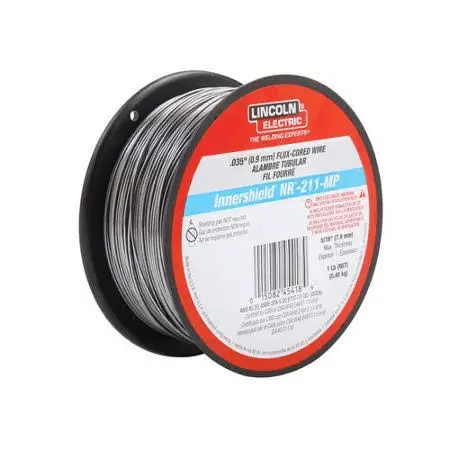Finding the right welding wire when you have minimum experience in welding can be challenging. The search can get confusing due to the different types of welding wires available out there. It takes a lot of research for inexperienced welders to identify the right welding wire for their specific needs.
When you start exploring, you will soon come across the heated debate regarding which is a better flux-cored welding wire between 030 and 035. Before we help you compare these two welding wires, we will teach you some basics about flux-cored welding that you should have at your fingertips. A flux-cored wire is a type of welding wire that is used in MIG welders. This wire is unique in that it comes with a flux coating.
Flux core welding wires can either be self or gas shielded. While a self-shielded flux-cored wire does not need an external shielding gas, this is a crucial requirement for the gas-shielded flux-cored wire. Such a wire is ideal for outdoor welding and is more portable. You can either choose the 030 or 035 flux-cored wire, depending on your welding requirements. Learn more!
Comparison table
| Product | 030 flux core wire | 035 flux core wire |
| Amperage | Low | High |
| Suitable for | Thinner metals | Thicker metals |
| Compatible welding machine | 210V | 250V |
| Check on Amazon | Check price here | Check price here |
How do 030 and 035 flux core wires compare?
One of the reasons why flux-cored wires are quite popular is because of their numerous benefits. They not only facilitate a high deposition rate but are also ideal for windy conditions. If you are considering a flux core wire, you need to understand the difference in their specifications. The numbers 030 and 035 are used to represent the diameter of the welding rod.
Sometimes, you may find these numbers written in the form of .30 or .35. In all of the models, the numbers should guide you in knowing how thick the welding rod is. A flux core wire that features a 035 electrode implies that it is thicker than one, which measures 035 by .005 inches. Though the difference may seem small, you should not disregard it since it can affect the quality of welds you can get from a simple selection.
Thicker rods are known to need a higher amperage in comparison with thin rods. This means that a 035 flux core wire needs a higher amperage compared to the 030 flux core wire. If you are searching for a fluxed cored welding wire that can help you weld a thick sheet of metal, then you need to stick with the 035 welding wire. Though this flux core wire is ideal for thicker metals, it tends to struggle when subjected to thin sheets of metal.
You should only choose the 035 flux-cored wire when you want to weld metal with a thickness of above 16 gauge. 030 flux core wire, on the other side, works best with thinner metals. The thicker the diameter of a wire, the deeper the penetration. While 035 flux core wires work well with 250 V machines, 030 flux-cored wires deliver great performance when used with 210 V machines.
030 flux core wire
The market offers different 0.30 flux-cored wire brands that you should compare. Each model is, however, known to have some unique features. You can use this wire to weld different materials, including galvanized metal or auto body parts. Most people like how smooth the flux core wire runs and the great bead it lays down.
As long as you choose this flux core wire for your thin metals, you will not spend hours cleaning up after welding. You will like the fact that using this flux core wire prevents you from experiencing high levels of spatter or smoke. You can weld metals more conveniently without the need to rely on an external gas container. Since the wire diameter is consistent, you should not experience constant feed problems. You need to choose this flux core wire if your welder is around 190 Amp.
Pros
- Ideal for general purpose welding
- It is affordable
- High deposition rates
- Minimal spatter
- It runs smoothly
Cons
- Performs poorly on thick metals
View price on Amazon
035 flux core wire

You can come up with the perfect welds when you choose 035 flux-cored wire for thicker metals. Whether you would like to weld thick galvanized roofing sheets or carbon steel, this form of flux-cored wire should not disappoint. The wire gives you a clean weld leading to a great bead appearance.
You can use this type of welding wire even in windy conditions. Due to its fast freezing characteristic, the flux-cored wire is ideal for numerous applications. This, however, needs more power that cannot be produced by some of the welding machines. Consider the type of welder you use before choosing this flux- cored wire.
The problem with some flux-cored wires under this category tends to produce a lot of spatter during welding. Ensure you compare different models so that you can pick one that is rated for minimal spatter. This can prevent you from a lot of clean up. If you don’t get one with such a rating, you should purchase an anti-spatter spray for you to get rid of spatter as you protect the work piece.
Ones you have bought this flux-cored wire, you need to learn how to maintain it well so that you can enjoy using it for years. It is a sensitive welding wire that can crush easily since the center is equipped with shielding compounds. You should, therefore, handle it with extreme care. Most welders in the automotive industry like the high-speed capability of this flux-cored wire.
Pros
- Welds through thick materials fast
- You can use it on most of the coatings and steels
- Works well even in adverse weather conditions
- Most people find this flux-cored wire user-friendly
- It offers deep penetration into the metal
- Low price
Cons
- Not ideal for thin metal
- You may experience high smoke levels
Verdict
A flux-cored wire can help you weld, cut, and shape a tool according to your preference. Unlike using solid wire, you can weld a rusted or dirty steel metal using a flux-cored wire. Such contaminants do not affect the quality of the weld. Since flux-cored wires accommodate everyone, including welders with little skills, they continue to gain a competitive edge over solid wires.
View price on Amazon
Though some people assume that 035 is better than 030 flux-cored wire, this assumption is inaccurate. Both of the flux-cored wires can give you excellent performance. Instead of focusing on which one is better than the other, you should concentrate on the type of metal you are working on so that you can choose the most suitable flux-cored wire.
If you want to weld metals that are below 1/ 4 inch in thickness, then the ideal fluxed cored wire, in this case, would be a 035 model. For a thinner metal, go for the 030 flux-cored wire. Apart from the thickness of the metal, you should also choose a flux-cored wire based on the welding machine you have. If you cannot find the right size of flux-cored wire, we recommend that you try searching for one online. You not only get to compare the different models available but also the price so that you can choose one that is in line with your budget.
FAQs
What do the numbers on flux-cored wires represent?
Flux-cored wires are classified into different categories and grouped according to their diameter ranges. The numbers that accompany flux-cored wires, therefore, represent the thickness of the rod.
Which are the application areas for this form of welding?
Though flux-cored welding has a lot of applications, the most common ones include stainless steel, which consists of both low and mild alloy steels. You can also use it to weld metals made from nickel.
What safety guides should I be keen on while practicing flux core welding
During this form of welding, you should expect the production of numerous sparks. It also involves the use of extreme heat and UV rays. You, therefore, need to use personal protection equipment to boost safety. Some of the equipment you need include a leather welding jacket, safety glasses, long pants, and helmet.
What should you have in mind as you choose the size of flux-cored wire?
Before you start shopping for a flux-cored wire, you need to consider the type of welder you have. Apart from its size, the amperage that your welding machine runs, as well as the plates it needs should guide you into choosing the right diameter range of your flux core wire.
Should you use a flux core wire on a clean or dirty metal?
One of the reasons why people prefer flux-cored wires as opposed to solid wires is because the metal does not have to be clean for you to weld. It is, however, recommended that you prepare the metal before you start welding to reduce the risk of porosity, which can weaken the weld’s integrity.
